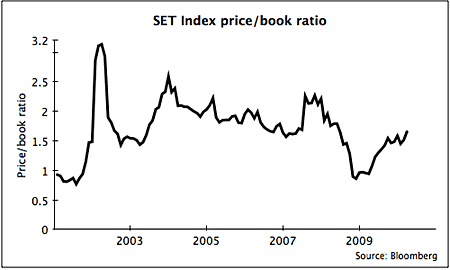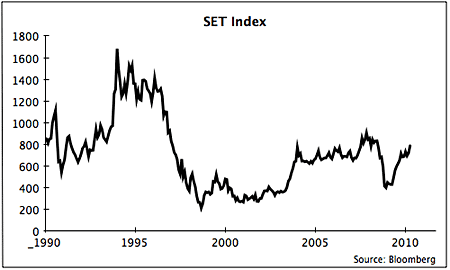Thailand's woes aren't over
Thailand's stockmarket has been at bargain-basement levels for well over a decade now. But it's cheap for a reason: Thailand has serious problems with no lasting solutions in sight, as recent events demonstrate. Cris Sholto Heaton looks at the country's plight, and asks whether it has hit the bottom yet.

Get the latest financial news, insights and expert analysis from our award-winning MoneyWeek team, to help you understand what really matters when it comes to your finances.
You are now subscribed
Your newsletter sign-up was successful
Want to add more newsletters?

Twice daily
MoneyWeek
Get the latest financial news, insights and expert analysis from our award-winning MoneyWeek team, to help you understand what really matters when it comes to your finances.

Four times a week
Look After My Bills
Sign up to our free money-saving newsletter, filled with the latest news and expert advice to help you find the best tips and deals for managing your bills. Start saving today!
Bangkok is again in turmoil. As you may have seen over the weekend, at least 21 people have been reported dead in clashes between political protestors and the security forces.
This is a shocking tragedy for Thailand. I know a number of MoneyWeek Asia readers are based in Bangkok, so I hope none of you have been harmed in the violence.
Yet I'm already hearing the familiar and cynical refrain, 'blood in the streets means it's time to buy'. I'm not especially comfortable seeing events such as this as investment opportunities at the best of times. But truth to tell, this is no buying opportunity anyway.
MoneyWeek
Subscribe to MoneyWeek today and get your first six magazine issues absolutely FREE

Sign up to Money Morning
Don't miss the latest investment and personal finances news, market analysis, plus money-saving tips with our free twice-daily newsletter
Don't miss the latest investment and personal finances news, market analysis, plus money-saving tips with our free twice-daily newsletter
Because sadly, I don't think this marks the end of Thailand's problems
The reasons behind the violence in Thailand
The Thai situation is extremely complicated. I last outlined it here, but here's a quick summary to bring it up to date.
The 'red shirt' demonstrators who were involved in the latest problems are supporters of former prime minister Thaksin Shinawatra. Thaksin was deposed in a military coup in 2006. He then returned to the country, but fled again after being convicted of corruption.
More from MoneyWeek AsiaThe sectors that will profit most from Asia's long-term growthWhy investment trusts are a great way to buy into AsiaA cheap play on Chinese demand
Thaksin, a billionaire businessman, was corrupt and had a shaky human rights record. But he was relatively efficient and genuinely popular with the rural poor. He was the first prime minister to try to do much to help them. His large election victories in 2001, 2005 and 2006 were a fair reflection of this popularity.
But he was unpopular with the Bangkok elite (including many former allies who helped him on his rise to office) and King Bhumibol. The king exercises considerable power behind the scenes, but Thailand's draconian lse-majest laws mean his role can't be discussed publicly. The 2006 coup undoubtedly had support from palace advisors, if not directly from the king himself.
The military government was incompetent and ineffectual. It handed back to civilian rule in 2007, in elections that were won by Thaksin's allies. Anti-Thaksin groups promptly formed a movement called the People's Alliance for Democracy (an odd name, given their desire to end elected parliaments) and adopted royal yellow as their colour to reinforce their royalist credentials.
The PAD then spent the next year undermining this government, and a revolving door of Thaksin-friendly prime ministers. They used a combination of legal challenges and street protests, including a three-day occupation of Bangkok airport. Finally, they forced the collapse of the government in December 2008. The opposition Democrat Party headed by Abhisit Vejjajiva took over, with support from defecting members of the pro-Thaksin coalition.
Expert tips & advice for investing in Asia! Claim your FREE guides from MoneyWeek that include:
- How to go about investing to Asia
- Which brokers to use to buy foreign shares
Since then the red shirt pro-Thaksin group has been agitating for new elections, which pro-Thaksin parties would almost certainly win. The confrontation has become increasingly dangerous, culminating in last weekend's tragedy.
Where to now for Thailand?
So what happens now? The upbeat view says that these events mark the worst of the conflict and a resolution will eventually follow. Sadly, I don't agree. Thailand's situation could easily deteriorate.
First, it's hard to see any sign that a compromise is imminent. After this bloodshed, the most extreme viewpoints on both sides are likely to become more entrenched.
The second factor is the role of the king. Although he intervenes in politics behind the scenes, Bhumibol is revered by both sides of the dispute. Due to the prohibition on talking about the king's role, rural Thais aren't really aware of the way he has acted against their interests by opposing Thaksin.
This loyalty to the king is what has held the country together up until now. He has played a key role in ending past bloodshed, such as the 1992 street demonstrations against the then military government.
He may be able to smooth over the latest problems, although the growing prominence of the pro-Thaksin movement suggests his reputation may be declining. But in any case, the king is now 82 and in poor health. When he dies, his restraining influence will vanish.
His son and heir is highly unpopular. He also has ties to Thaksin, making him unacceptable to most of the political and military elite. There is some discussion of the king's daughter taking over as a regent; however, while popular, she doesn't inspire the same devotion as him. More importantly, just sorting out the royal family's succession issues clearly isn't a solution to the underlying dispute between rural Thai and the elite. The influence of the palace is a key part of the issue. But it's not the root of the problem.
Thailand's stock market is cheap for a reason
All of this is a tragedy for Thailand. Not just in terms of this weekend's deaths, but also because of the way these problems are holding the country back. Thailand has made real progress on many fronts in the last few decades. For example, real GDP has grown by an average of 4% a year in the past decade. Manufacturing's share of GDP is up by 70%. And the proportion of students in secondary education has doubled.
With many advantages in terms of natural resources and tourism potential, Thailand should be one of the best prospects in Asia. Yet political paralysis is preventing it from moving forwards. And the worse the situation gets, the more likely it is to scare off investment.
So its no surprise that the Thai market trades on low valuations. As many are now pointing out, the price/earnings ratio and price/book ratio for the SET Index are among the lowest in Asia, at around 14.5 and 1.5 respectively. Yet as the chart below of the price/book ratio shows shows, its been this way for a long time.

In fact, the SET has made virtually no progress over the last decade, in contrast to the rest of Asia. Thailand remains cheap and unwanted because it has so many problems with no apparent resolution in sight.

Of course, there could be a surprise solution. The bloodshed could bring everyone to their senses. The red shirts want an election within 15 days. Abhisit a decent prime minister trying to make the best of an appalling situation - says he will call one late this year. Perhaps a compromise on timing can be found.
If the military holds off on staging yet another coup, then perhaps a compromise government could come together with the aim of reducing frictions with rural voters.
But unfortunately, given the venality of Thai politics and the number of factions jostling behind the scenes, this looks unlikely. I hope I'm wrong, but I don't think Thailand has hit bottom yet.
This article is from MoneyWeek Asia, a FREE weekly email of investment ideas and news every Monday from MoneyWeek magazine, covering the world's fastest-developing and most exciting region. Sign up to MoneyWeek Asia here
Get the latest financial news, insights and expert analysis from our award-winning MoneyWeek team, to help you understand what really matters when it comes to your finances.

Cris Sholt Heaton is the contributing editor for MoneyWeek.
He is an investment analyst and writer who has been contributing to MoneyWeek since 2006 and was managing editor of the magazine between 2016 and 2018. He is experienced in covering international investing, believing many investors still focus too much on their home markets and that it pays to take advantage of all the opportunities the world offers.
He often writes about Asian equities, international income and global asset allocation.
-
 Early signs of the AI apocalypse?
Early signs of the AI apocalypse?Uncertainty is rife as investors question what the impact of AI will be.
-
 Reach for the stars to boost Britain's space industry
Reach for the stars to boost Britain's space industryopinion We can’t afford to neglect Britain's space industry. Unfortunately, the government is taking completely the wrong approach, says Matthew Lynn